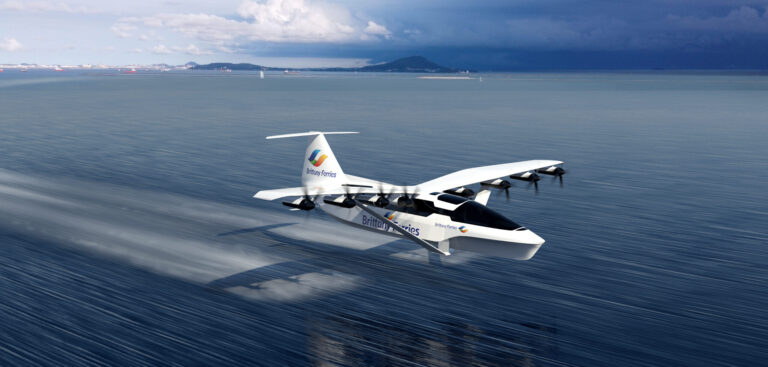Brittany Ferries is to explore the possibility of a high-speed, sustainable ferry called a seaglider. The concept is based on an all-electric, wing-in-ground-effect vehicle (WIG), and is currently under development in Boston, Massachusetts, by startup company REGENT (Regional Electric Ground Effect Nautical Transport).
A letter of intent has been signed by Brittany Ferries to bring seagliders to routes between the UK and France by 2028, carrying around 50-150 passengers across the Channel. REGENT estimates that by 2025, the first commercial passengers will travel on smaller electric craft.
By combining hydrofoils, the aerodynamic efficiency of hovercraft and the speed of aircraft, seagliders could become a convenient mode of transport in years to come. With speeds of up to 290km/h achievable and a battery range of 290km, the form of marine transport could prove to be six times faster than when using a traditional ferry. With power being provided by batteries, the seaglider is expected to become increasingly sustainable as more electricity is generated from renewable sources.
When moving across the ocean, the seaglider ferry will harness a concept called ground effect – a cushion created by high-pressure air that becomes trapped between wings and the water in this instance, when flying at a low altitude.
Rising on hydrofoils, the vessel will be capable of transporting occupants above the waves, enhancing comfort and overall passenger experience. Wing-mounted propellers will be fitted to provide necessary thrust when taking to the air at low speeds. Electric motors will then regulate the airflow over the seaglider’s wings when traveling on the air cushion. A combination of next-generation sensor suites will be used to detect and avoid other seagoing vessels.
“Seaglider is an attractive and exciting concept, and we look forward to working with REGENT in the months and years to come,” commented Frédéric Pouget, ports and operations director at Brittany Ferries. “We are particularly pleased to contribute now because it means we can bring real-world challenges and potential applications into the company’s thinking at an early stage. We hope this may help bring commercial success in the years that follow. Who knows – this could be the birth of ferries that fly across the Channel.”
At present, REGENT is working on multiple sizes of seagliders, with the possibility of serving 290km-long routes. With the next-generation batteries fitted, the startup predicts that routes up to 500 miles could be serviced.



